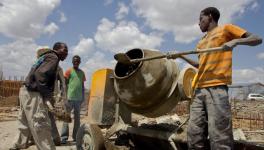UNSC’s Rape-in-War Resolution Exhibits Huge Injustice to Human Rights

In the 8514th meeting of Security Council, on April 23, the United Nations passed a historic resolution [2467:2019] to adopt measures on ending sexual violence in conflict. But the resolution passed by the UN omitted crucial terminologies contouring sexual violence. Among them were ‘reproductive healthcare’ and ‘formation of working groups to review progress on ending sexual violence.
Trump's Tactics
US actually threatened to veto the resolution over its language on reproductive and sexual health. US, Russia along with China, opposed the creation of a new working body to monitor and report the sexual atrocities. Even after these terms were stripped from the resolution, Russia and China abstained from voting.
It is important here to understand that the watering-down of the initial resolution by UN was just to appease Trump’s administration over the abortion ban. US State Department did not respond to Foreign Policy’s request for comment as it ran an exclusive story on this inside UN spat and dialogue. It becomes clear that US Government did not want any global hindrance resulting from UN negotiations and resolutions against its domestic anti-abortion stance.
US Government also tried to quash the use of ‘gender’ word from the rape-in-war resolution as it could promote transgender rights. It is quite ironical to observe that US in the UNSC debate refused to agree on previously agreed 2013 resolution [Legal situation:19Para] which recognised the importance of providing non-discriminatory and comprehensive health services, including sexual and reproductive health.
What is on the Stand?
This resolution can easily be credited to Nadia Murad, an untiring force behind the movement demanding the abrogation of use of sexual violence in war and armed conflict. Nadia, 2018 Nobel Peace laureate, runs Nadia’s Initiative- an organisation dedicated to help and re-build lives of women and children affected by war atrocities.
Also Read: Nobel Peace Prize for 2 Anti-Sexual Violence Crusaders
Nadia Murad recalled that Islamic State in Iraq and the Levant (ISIL/Da’esh) enslaved thousands of Yazidi girls and women as the resolution passed. She pointed out that her repeated calls for the creation of a working group to rescue those still missing or held in captivity have fallen upon deaf ears. None has been tried for sexual enslavement crimes committed against Yazidi girls and women, she insisted.
Nadia was right from the very beginning that the resolution wouldn’t be passed in its original form. The obstruction – suffered from the most intellectually progressive and economically developed countries – highlighted that humans not having the nationality of these countries are to be treated with inhumanity.
United Nations: Helpless?
Just within a week of the historic resolution, Israel has killed two pregnant women and a minor in airstrikes. The power of the UN Secretary-General, António Guterres is only limited to verbal condemnation in ‘strongest terms’. The ongoing vicious cycle of violence, an UN report says, in over a year, took close to 200 Palestinians, including more than 40 children and over 1,300 have been injured.
Nickolay Mladenov, the UN Special Envoy for the Middle East Peace has appealed for the de-escalation of violence between Israel and Palestine. The violation of Egypt-brokered and UN-backed cease-fire illustrates the insignificant diplomatic position of United Nations.
Gaza bombings show that the backing of veto countries is important to maintain a neat geopolitical image despite flaring of scathing violence. As US is set to recognise Israel’s sovereignty over Golan Heights, the changing US policy in Middle East may trigger turbulence while defending countries like Israel which are on the US side. It is uncertain whether these countries will agree upon the UN rape-in-war resolution.
Also Watch: Trump Violates International Law on Golan Heights
What Lies Ahead?
Veto bloc is not a new threat. The basic idea behind the amalgamation of veto power was to counteract war-like situations between powerful countries, thus, minimising the chances of a next world war. Against this, the present scenario comprises of conflicts which are not global in nature but distributed across different regions and are usually bilateral. In this situation, the role of veto power doesn’t matter much. Oppositely, this has been widely used as an unscrupulous mean by the veto countries. China blocking Masood Azhar’s listing on UN blacklist is a testimony to it.
The diabolical stands of the US administration mark the fall of this world power on democratic principles. It is disappointing to see UN's submission to US.
The only option UN members have, for facilitating the proper functioning of the world body, is to urge UN to outlaw veto bloc. Inducing countries like India or Japan in this bloc will further complicate the working of UN.
UN rights charter, along with strong resolutions like UNSC’s rape-in-war resolution cannot be successfully implemented unless the power disparity among countries is addressed in the UN. Will veto powers like US ever face a Nuremberg moment? That remains a conundrum.
Author is an independent journalist and serves as an editor at Academia.edu. He writes on social inequality and rights in India. The views are personal.
Read More: The Struggle for Legal, Safe and Free Abortion Across Latin America
Get the latest reports & analysis with people's perspective on Protests, movements & deep analytical videos, discussions of the current affairs in your Telegram app. Subscribe to NewsClick's Telegram channel & get Real-Time updates on stories, as they get published on our website.
























